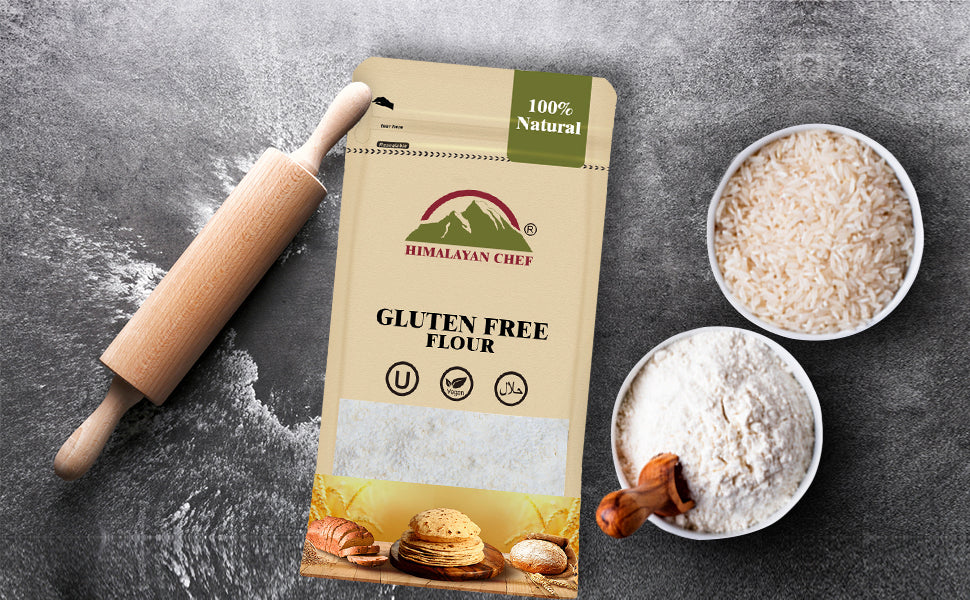Gluten Free Flour vs Regular Flour
Posted by HIMALAYAN CHEF

When we're cooking or baking, flour is like a magic ingredient that helps create all sorts of delicious dishes. But, for some people who cannot eat gluten, a protein found in wheat, using regular flour can be a problem. That's where flour free from gluten comes in – it's a special kind of flour that's good for celiac disease patient.
Flour: Regular and Gluten Protein Free
Flour is the main ingredient that helps to make rotis, cakes, cookies, and more. But there are some people who cannot eat gluten, a special part of flour that can cause problems for them. Regular flour like wheat, barley has gluten, while flour free from gluten doesn't. This special flour is made from ingredient like rice, corn, and other grains that don't have gluten.
Why Gluten Protein Free Flour Matters
Well, some people cannot eat gluten because it can make them sick; e.g. Patients having celiac disease. Imagine feeling bad after eating something yummy – not fun, right? That's why flour free from gluten is important. It helps these people enjoy tasty foods without feeling sick.

Regular Flour vs Gluten Protein Free Flour
| Regular Flour |
Gluten Protein Free Flour |
|
| ☑ Composition |
Traditional flour is predominantly derived from wheat, a grain rich in gluten. Gluten is a protein that gives elasticity to dough and helps baked goods hold their shape. |
This flour made from alternative grains like rice, corn, or legumes, which do not naturally contain gluten. It often involves a blend of these grains to mimic the texture and properties of regular flour. |
| ☑ Texture and Consistency |
The absence of gluten in gluten-free flour leads to differences in texture and consistency compared to regular flour. Gluten provides that desirable chewiness in bread and the structure in pastries. |
Baked goods made with gluten-free flour might be a bit crumbly or have a different mouthfeel due to this missing element. |
| ☑ Binding Agents | No need of binding agents | Baking free from gluten often requires additional binding agents such as xanthan gum or guar gum, which help mimic the binding properties of gluten. These agents ensure that the batter or dough holds together, resulting in better texture and structure. |
Importance of Gluten Protein Free Flour
✔ Catering to Gluten Sensitivities and Celiac Disease:
One of the most significant reasons for the importance of gluten free flour is its role in accommodating individuals with gluten sensitivities or celiac disease. Celiac disease is an autoimmune disorder in which even small amounts of gluten can trigger an immune response, damaging the lining of the small intestine. Flour free from gluten provides an avenue for those affected to enjoy a diverse range of foods without compromising their health.
✔ Inclusivity in Cooking:
By utilizing flour free from gluten, cooks and bakers can create dishes that can be enjoyed by a wider audience.
Health Benefits of Gluten Protein Free Flour
⚫️ Improved Digestion: For those with gluten sensitivities or celiac disease, consuming gluten can lead to digestive distress, including bloating, diarrhea, and abdominal pain. Opting for flour free from gluten eliminates these issues and promotes smoother digestion.
⚫️ Increased Nutrient Diversity: Flours free from gluten are often sourced from various grains, such as rice, and corn. This diversity brings a broader range of nutrients to your diet, including vitamins, minerals, and antioxidants present in these alternative grains.
⚫️ Balanced Blood Sugar Levels: Some flours free from gluten, like almond and coconut flour, have a lower glycemic index compared to traditional wheat flour. This means they have a milder impact on blood sugar levels, making them suitable for individuals looking to manage their blood sugar.
⚫️ Supports Weight Management: Many flours free from gluten are naturally lower in carbohydrates and calories than wheat flour. This can aid in weight management efforts by offering a way to enjoy baked goods with reduced caloric content.
⚫️ Promotes Heart Health: Certain flours free from gluten, like oat flour, are rich in soluble fiber, which has been linked to improved heart health by helping to lower cholesterol levels.

Best Gluten Free Flour
Himalayan Chef Gluten-Free Flour is made from 100% Natural Whole Grains and ground really well. Himalayan Chef’s flour is special and can be used in many ways. It tastes a little nutty and good, and it makes your baked things taste even better. This flour is great for making yummy baked things that don't have gluten. It's light and soft and doesn't taste like much, so it works well. It's also certified to be gluten-free, not made from genetically changed things, and it doesn't have fake colors, flavors, or preservatives.
Conclusion
In the world of cooking, things are always changing and getting better. Gluten-free flour is one of these better things – it's a healthy option that's not only good for people with certain diets, but it also helps our bodies be healthier. It helps our stomachs work well and gives us different nutrients. So, whether you're making food for yourself or for friends, try using flour free from gluten to make tasty and healthy dishes.
TAGS:
SHARE:


